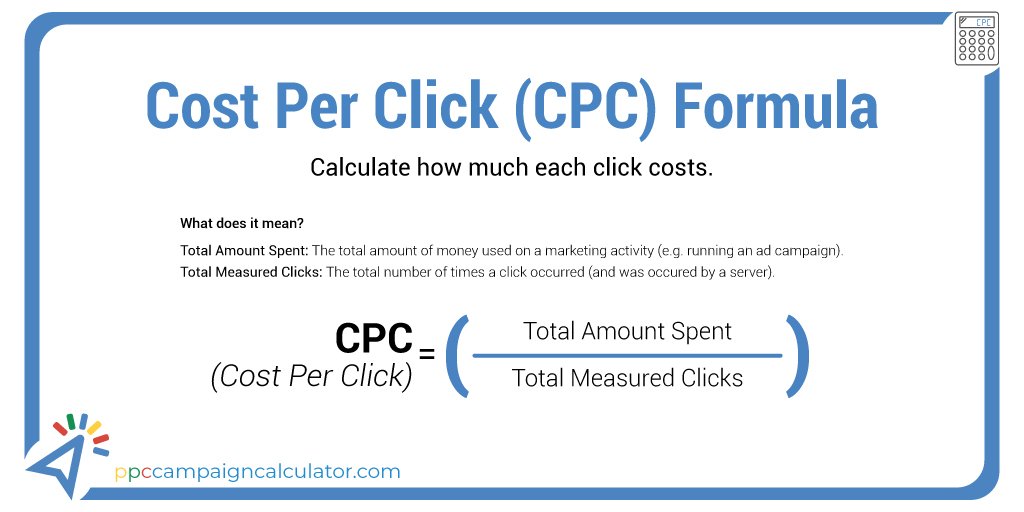Cost Per Click Calculator - (CPC)
We have provided a useful CPC Calculator below to work out your CPC as well as
derive the number of
clicks and cost you would need to get a specific CPC.
If you want to know how to calculate your CPC, feel free to experiment with our Cost Per Click
calculator below using different scenarios in order to help you understand this pricing model better.
CPC Calculator
How to Calculate CPC
The Cost Per Click equation is:

What is the cost per click calculator?
A Cost Per Click (CPC) calculator is a tool used in online marketing to
determine the cost of each click on an advertiser's ad. Advertisers pay a specified amount each time
a user clicks on their advertisement in a CPC advertising arrangement. This pricing strategy is
standard for internet advertising platforms such as Google Ads.
For instance, if an advertiser pays $100 on a campaign and gets 200 clicks, the CPC is:
CPC = Cost ÷ Clicks
CPC = $100 / 200 = $0.50
In this scenario, the marketer is paying $0.50 for each ad click.
Advertisers value CPC because it allows them to measure the effectiveness as well as the value of
their advertising efforts. It reveals how much businesses pay for user engagement and can be used to
manage advertising tactics.
Why is cost per click calculator important?
The Cost Per Click (CPC) calculator is useful in the context of online
advertising for various reasons:
-
Budgeting and cost management:
Advertisers frequently work within a budget for their advertising efforts. Calculating CPC allows them to calculate the amount they are going to spend for each ad click. This data is essential for proper planning and expense control. -
Performance Management:
CPC is an important indicator for analyzing the effectiveness of an advertising campaign. Advertisers can assess the success of campaigns by comparing CPC to other key performance indicators (KPIs) such as conversion rates, click-through rates and return on investment (ROI). -
Campaign Optimization:
Advertisers can decide which keywords, advertising placements or targeting strategies are the most cost-effective by reviewing CPC data. This data enables them to improve their campaigns by providing more funding to efficient sources and reducing or deleting those that are underperforming. -
Bid Strategy:
Understanding the CPC is critical for setting competitive and effective bids in pay-per-click (PPC) advertising where advertisers compete for ad placement. Advertisers can optimize their ad placement and exposure by adjusting their bid tactics based on previous CPC data. -
ROI Calculation:
Understanding the cost-per-click (CPC) is critical for evaluating the return on investment (ROI) of an advertising campaign. Advertisers can analyze the total profitability of their campaign by comparing the cost of obtaining a consumer (CPC) with the income generated from that customer. -
Bench marking:
Advertisers can utilize CPC to compare their performance to comparable businesses or opponents. This information provides insight for determining whether the cost of clicks they pay follows market norms or not. -
Ad Platform Evaluation:
For advertisers who use many advertising platforms, comparing CPC across platforms can aid in determining the cost-effectiveness of each. It aids in making informed judgments about where to spend money on advertising to achieve the best results.
In summary, the CPC calculator is a vital tool for marketers in the dynamic and competitive landscape of online advertising to manage costs, analyze performance, manage campaigns and make data-driven decisions.
How do you calculate the cost per click?
The total cost of an advertising campaign is divided by the number of
clicks received to obtain the Cost Per Click (CPC). CPC is calculated using the following formula:
CPC= Cost of Advertising / Number of Clicks
Here's a step-by-step guide:
-
Calculate the Total Cost:
This figure represents the total money spent on the advertising campaign. It can involve expenditures such as the actual cost of clicks, platform fees or any additional campaign costs. -
2.Determine the number of clicks:
The total number of clicks shows the total number of times users clicked on the advertisement. Typically, this information is supplied by the advertising platform where the campaign is being run. -
Apply the Formula:
Once you have the total cost and the number of clicks, plug these values into the formula. -
Calculate:
Perform the calculations to find the cost per click.
Conclusion:
It's necessary to remember that CPC is a dynamic statistic that can shift over time depending on a variety of factors such as bid strategy, competition and the success of advertising content. Advertisers usually pay close attention to CPC to make appropriate allocations of funds and decisions for the optimization of the campaign.
FAQs:
Q: Is it possible to lower my Cost Per Click (CPC)?
Answer: Yes, it is. By optimizing ad relevancy, improving click-through rates, refining keyword targeting and enhancing overall ad quality. Experiment with ad creators, modify bids and update your campaign regularly to get a lower CPC.
Q: Is it always a disadvantage to have a higher CPC?
Answer: No, not always. Higher CPCs may be acceptable if they correlate to more competitive and rewarding keywords or if they lead to premium ad placements with better exposure. It's critical to strike a balance between CPC and total campaign performance, taking into account factors like conversion rates and return on investment.